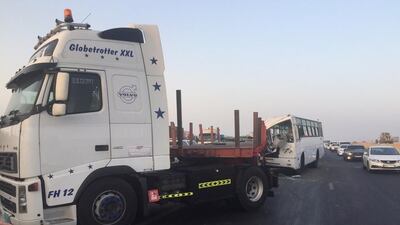ABU DHABI // The number of road deaths in Abu Dhabi fell by 8 per cent last year, compared to the year before.
The emirate recorded 245 fatalities last year and 267 in 2014.
The number of traffic accidents fell by 3 per cent, from 1,864 to 1,803, said Brig Hussain Al Harthi, director general of central operations at Abu Dhabi Police.
The number of registered vehicles rose by 17 per cent, while new driving licence holder numbers were up 6 per cent over the period.
According to Al Ittihad, The National’s Arabic sister publication, Brig Gen Al Harthi attributed the decrease in fatalities and casualties to improved driver awareness, policing, use of radars and other traffic monitoring systems.
Brig Al Harthi said the main causes of accidents last year included neglect and inattention (19 per cent), sudden swerving (16 per cent), excessive speed (12 per cent) and failure to observe safe distance between cars (12 per cent).
He urged drivers to follow traffic laws.
Drivers aged 18 to 30 caused 47 per cent of accidents, with drivers aged 31 to 45 causing 35 per cent of them.
Over the same period, 85 per cent of fines handed out were for speeding, 5 per cent were for jumping red lights and 3 per cent for not giving way to pedestrians.
Thomas Edelmann, founder of Road Safety UAE, said the reduction in fatalities and accidents was “highly commendable”.
“The reason for this positive trend is a balanced approach to further improving the three Es of road safety: engineering, enforcement and education,” he said.
“There has been steady progress in the development of improved road infrastructure, the development of safety features in vehicles, increasing traffic control, installing more state-of-the-art radar cameras, and traffic safety awareness initiatives targeting young drivers.
More, still, needs to be done – through stricter enforcement and education – to address reckless driving, Mr Edelmann said.
“We have to dig deeper to understand the reasons motorists swerve lanes, speed, and tailgate, among other issues,” he said.
Last year, YouGov conducted a study for Zurich Insurance Middle East and RoadSafety UAE to shed light on the leading causes of speeding in the UAE.
Sixty-seven per cent of 1,005 residents polled said they drove at excessive speeds because they were running late, 53 per cent said they did it for fun or to impress others, and 45 per cent said they did it out of habit.
“Running late also plays a role in bullying other traffic participants, tailgating, jumping queues and jumping red lights,” Mr Edelmann said.
“The root causes of misbehaviour – rather than the symptoms – need to be addressed by focused education and awareness campaigns for vulnerable segments like young drivers.”
rruiz@thenational.ae

